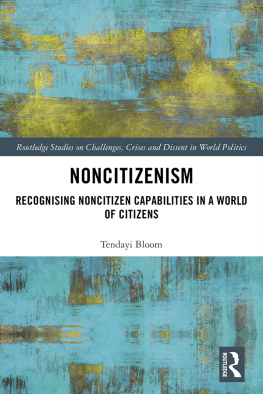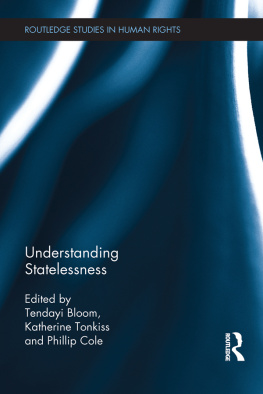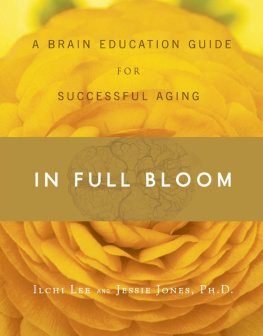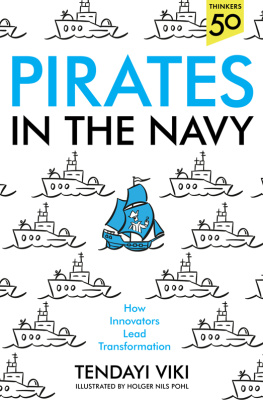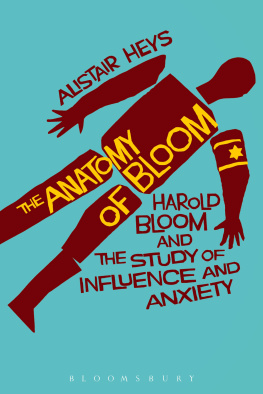It takes a bold thinker to introduce a new term into the thicket of contemporary discussions of citizenship, migration and belonging. Tendayi Bloom does this with her ambitious concept of noncitzenism. She presents noncitizenship as a unifying analytic category that describes a particular relationship between individuals and States. Her claim is that the relationship deserves attention because of its special consequences for the rights of affected individuals, irrespective of their particular type of noncitizenship. Cogently argued and lucidly written, this impressive book is both a valuable addition to the literature on one of the major political challenges of our times, and a stimulating provocation for constituencies actively engaged in contesting the many injustices it describes.
Jacqueline Bhabha, Harvard University, USA
By documenting critical social movements this book illustrates how the rights of noncitizens are being constituted as a site of political struggle. It is a brilliant book that restores political agency to noncitizens in (liberal) theory something that states resist in (illiberal) practices.
Engin Isin, Queen Mary University of London, UK
This book is a timely challenge to methodological citizenism the assumption that all political thinking has to be structured around citizenship. Against this, it poses the idea of noncitizenship, rather than non-citizenship. Drawing on a wide range of resources, it points the way forward, offering a vision of what liberal theory and practice could look like if they were to break out of the state-citizen relationship. And it stands as an urgent warning that, if they are to remain relevant to the project of social justice, then they must embrace the category of the noncitizen as an essential part of the liberal framework. It is essential reading for anybody concerned with the contradictions of national membership and global justice.
Phillip Cole, University of the West of England, UK.
Noncitizenism
Noncitizens have always been present in liberal political philosophy. Often hard to situate within traditional frameworks that prioritise citizenship, noncitizens can appear voiceless and rightsless, which has implications for efforts towards global justice and justice in migration. This book proposes an alternative.
Noncitizenism identifies an analytical category of noncitizenship. While maintaining the importance of citizenship, noncitizenship is another form of special individual-State relationship. It operates far from a State, at its borders, and within its territory, providing a tool for examining the continuity between sites of engagement and the literatures, questions and conclusions relating to them. The book argues that an accurate liberal theoretical framework, and one which can address contemporary challenges, must acknowledge the political relationship of noncitizenship between individuals and States.
This book is for students and scholars of political philosophy and for those interested in noncitizenship and how it can inform the response of liberal theory, citizenship, global justice, migration studies, political theory and policy work.
Tendayi Bloom is Lecturer in Politics and International Studies at The Open University, UK.
Routledge Studies on Challenges, Crises and Dissent in World Politics
Series editors: Karoline Postel-Vinay
Centre for International Studies and Research (CERI), France
and
Nadine Godehardt
German Institute for International and Security Affairs, Germany.
This new series focuses on challenges, crises and dissent in world politics and the major political issues that have surfaced in recent years. It welcomes a wide range of theoretical and methodological approaches including critical and postmodern studies, and aims to improve our present understanding of global order through the exploration of major challenges to inter/national and regional governability, the effects of nationalism, extremism, weak leadership and the emergence of new actors in international politics.
For more information about this series please visit: www.routledge.com/Routledge-Studies-on-Challenges-Crises-and-Dissent-in-World-Politics/book-series/CCDP
Empires of Remorse
Narrative, Postcolonialism and Apologies for Colonial Atrocity
Tom Bentley
Crisis and Institutional Change in Regional Integration
Edited by Sabine Saurugger and Fabien Terpan
Violent Non-State Actors
From Anarchists to Jihadists
Ersel Aydinli
Power-Sharing
Empirical and Normative Challenges
Edited by Allison McCulloch and John McGarry
Hegemony and Resistance around the Iranian Nuclear Programme
Analysing Chinese, Russian, and Turkish Foreign Policies
Moritz Pieper
Noncitizenism
Recognising Noncitizen Capabilities in a World of Citizens
Tendayi Bloom
Noncitizenism
Recognising Noncitizen Capabilities in a World of Citizens
Tendayi Bloom
First published 2018
by Routledge
2 Park Square, Milton Park, Abingdon, Oxon OX14 4RN
and by Routledge
711 Third Avenue, New York, NY 10017
Routledge is an imprint of the Taylor & Francis Group, an informa business
2018 Tendayi Bloom
The right of Tendayi Bloom to be identified as author of this work has been asserted by her in accordance with sections 77 and 78 of the Copyright, Designs and Patents Act 1988.
The Open Access version of this book, available at www.taylorfrancis.com, has been made available under a Creative Commons Attribution-Non Commercial-No Derivatives 4.0 license.
Trademark notice: Product or corporate names may be trademarks or registered trademarks, and are used only for identification and explanation without intent to infringe.
British Library Cataloguing in Publication Data
A catalogue record for this book is available from the British Library
Library of Congress Cataloging in Publication Data
A catalog record for this book has been requested
ISBN: 978-1-138-04918-5 (hbk)
ISBN: 978-1-351-68979-3 (ebk)
Typeset in Times New Roman
by Wearset Ltd, Boldon, Tyne and Wear
Throughout the almost nine years I have spent working on this book, many wonderful people have given generous support, guidance and insight. This acknowledgements section is my inadequate token of thanks to them.
The kernel for this project arose from my doctoral work at, and with funding from, Queen Mary University of London (QMUL) School of Law from 2008 to 2012, where the inclusive and dynamic academic community and the fantastic supervision of Richard Ashcroft made it a great place to begin the research. I am also grateful for the encouragement of Jonathan Glover and the additional support particularly from Prakash Shah and Kate Malleson, and the QMUL PhD community, the Centre for the Study of Migration at QMUL and the LSE migration studies graduate reading group. Working at the UNU Institute on Globalization, Culture and Mobility in Spain from 2012 to 2015 provided exciting opportunities for engagement in political processes and colleagues with whom to discuss the questions presented here: Megha Amrith, Valeria Bello, Tatiana Diniz, Anna Franzil, Parvati Nair, Janina Pescinski, Regina Salanova and Francesco Vacchiano.


